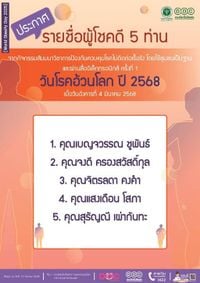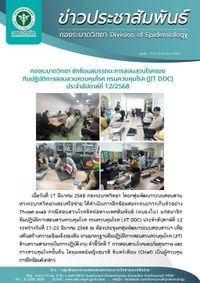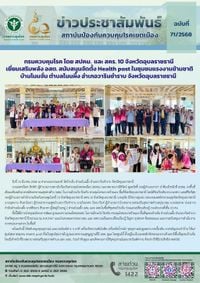The Department of Disease Control in Thailand is sounding the alarm over the continuing rise in the use of heated tobacco products (HTPs) among youth, a trend that is fast becoming a public health concern. Health experts note that many young users mistakenly believe that these products are less harmful than traditional cigarettes, yet research indicates otherwise.
According to Dr. Sutthas Chotnapan, Deputy Director-General of the Department of Disease Control, heated tobacco products utilize a heating method rather than combustion, leading many to assume they pose lower health risks. However, he highlighted that the vapor emitted from HTPs still contains numerous toxic substances that could have significant health implications.
Backed by extensive research, including a study from the Institute of Biomedicine and Medical Science, in collaboration with the University of Colorado, findings suggest that individuals using HTPs are at a twofold greater risk for developing metabolic syndrome. This syndrome encompasses a spectrum of issues such as obesity, high blood pressure, elevated blood sugar levels, and increased blood fat levels, all of which contribute to chronic health problems.
Chronic diseases, which include diabetes and cardiovascular issues, are on the rise among HTP users, particularly for those who have engaged with these products for more than three years, indicating a substantial health risk looming in the future for this demographic.
Further reinforcing the need for caution, Dr. Chayanan Sitthibut, Director of Tobacco Control Commission, remarked on the Department's strong commitment to reducing chronic disease incidence. He conveyed that maintaining the ban on the import and distribution of all heated tobacco products is crucial in preventing youth and young adults from gaining access to HTPs. The focus is to eliminate their exposure to these products and minimize the risk of nicotine addiction.
The Department of Disease Control also stressed the importance of ongoing education about the dangers associated with HTPs. Partnerships with local universities, including Chulalongkorn University, Thammasat University, and Mahidol University, have been established to help convey critical health messages and deter use among younger populations.
In addition to addressing tobacco concerns, the Department recently held a press conference that underscored measures to protect public health in light of ongoing respiratory illness outbreaks. From January 1 to March 14, 2025, they reported 211,194 cases of respiratory illness, resulting in 23 fatalities, primarily among individuals with preexisting health conditions.
The most affected group has been children aged 5 to 9 years, with influenza cases comprising a significant percentage of reported illnesses. The influenza strain A/H1N1 has been predominantly responsible for these infections, particularly amongst school-aged children.
Doctor Churachai Wongsawadi, a prominent public health figure, highlighted the significance of vigilant preventive measures, including mask-wearing in populated areas, frequent handwashing, and taking necessary precautions for those exhibiting respiratory symptoms. Individuals who fall ill are advised to refrain from contact with others until they have recovered to mitigate further spread.
As seasonal illnesses progress, the government has also observed a drop in dengue fever cases in 2025. Only 5,615 cases were reported, a decrease of fourfold from previous years. However, the risks associated with this mosquito-borne disease remain high for senior individuals, reinforcing the need for strict measures to control mosquito breeding and maintain proper sanitation.
The health officials detailed various measures to pursue, including ensuring that the environment is clean and encouraging individuals to stay indoors, if possible, in locations with mosquito nets, especially in the presence of patients with fevers.
In light of the rising epidemic of respiratory diseases, officials recommended community members drink plenty of fluids, maintain good hygiene practices, and ensure proper cleaning and food handling to stave off acute diarrhea and foodborne illnesses.
Dr. Wongsawasdi reinforced the call for all sectors of society by promoting a campaign against rabies by encouraging pet owners to vaccinate their pets regularly, as rabies has resulted in three reported fatalities in Thailand in 2025.
With the ongoing threat of zoonotic diseases, citizens are advised to be cautious when in contact with animals, avoid areas populated with wild animals, receive vaccinations if needed, and ensure their pets are regularly checked by qualified veterinarians.
The Department of Disease Control is also keeping watch over a potential resurgence of the Nipah virus and avian influenza; both of these diseases present severe health risks. There have been a few reported cases of Nipah in Thailand, primarily linked to bat exposure, and health officials continue to prepare for any outbreak scenarios.
The message is clear: prevention is better than cure. The agency urges everyone to stay informed, take appropriate preventive actions, and consult healthcare providers as necessary.






